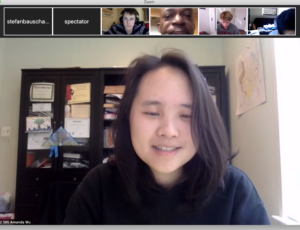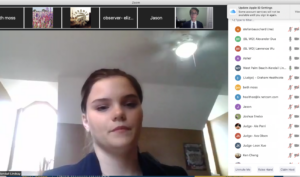 *Student enthusiasm was incredibly high
*Student enthusiasm was incredibly high
*We had almost no technology related issues
*The most difficult problem was running the tournament was judge management that was not related to judges’ technology usage
*Actions need to be taken to reduce the number of student trolls
*Schedules need be carefully managed
*Participants in events need to consider certain modifications
This past weekend we ran what would normally be the regular Georgetown tournament online.
We had 66 schools representing 3 countries and 26 states. Four hundred and fifteen students participated and 186 people judged debates. We had 4 tournament administrators.
The tournament utilized 110 rooms simultaneously. Tabroom.com was used for standard scheduling and the Classrooms.cloud platform was used to host the debates online.
340 students participated in Public Forum
48 students participate in Policy
18 students participated in L-D
13 students will participate in online OO this week.
These are some important notes regarding the tournament.
Enthusiasm
One thing that continues to make this incredibly rewarding is the student enthusiasm to keep debating. Students didn’t even blink about debating past midnight on Saturday and after the PF finals it was great to listen to hear students say they wrote six cases for the tournament. Many kids love to debate and I’m glad we were able to give them this opportunity. 
Technology
We had very few technology problems and technology related problems.
Zoom. Our platform uses and embedded Zoom classroom and Zoom made a few security changes the day the tournament started and on the second day. On day one our adaptations didn’t cause any issues. On day two it slowed things down about 5 minutes. As someone noted, this is sort of like the elevators not working for 5 minutes. In two online tournaments we’ve had on this platform this was the only delay.
SES. Two students from very low SES backgrounds had to drop due to power and internet outages. On the other hand, we did have a NYCUDL school with 51 percent free lunch win a division. The participants were generally higher SES students.
Judges
The most difficult problem we had was getting judges the programs provided to go to their debates. Ninety to ninety five percent of the rounds started on time, but every round we had to replace approximately five percent of the judges and it took a really long time to get these judges replaced, as almost no one who was sent replacement texts went to their rounds unless they were tournament hired judges. As a result, we had to hire a lot of additional judges at considerable expense.
The judges who didn’t show were not having tech problems. They simply were not going to their debates.
To help overcome these problems we suggest the following.
Judge check-in. Program directors are not doing a great job managing their judges. They don’t have a clear sense of who is ready to judge. They aren’t able to contact them to get them to judge when they are supposed to be judging. To make this work better we need to be more proactive at having judges individually check in each day. Ideally, this would happen after modifications on tabroom.com, but for now tournament directors need to find another way to do it.
Program Director management. When judges are not going to judge program directors need to be available to be responsible for these judges. They need to agree to it ahead of time and to make the process easier we suggest the following
(1) Identifying a judge by school. Tabroom.com should put the judge’s institution next to their name on the front end and back end pairings. Since it doesn’t do this now, we will manually add their institution in parenthesis.
(2) Group notification. It is too time consuming to contact program directors individually so for the next tournament we are going to put all program directors in a group chat (this will be a condition for registration) and if a judge is missing we will put a notice in the group.
(3) Fines. We don’t like to fine people, but we are going to have to have an aggressive fine system for people who miss debates.
(4) Team removal. If a program’s judges continue to miss rounds during the tournament we are going to have to remove their teams.
(5) Adults. For reasons that extend beyond the judging issue, tournaments have to ensure that adults are registering students and take responsibility for both the students and the judges. For future tournaments, we will require a video conference with any adult we do not know in order to ensure he or she is taking responsibility for the students and judges during the time of the tournament.
On the tournament admin side, we will work on the following —
-
- Hiring more judges to start the tournament, anticipating last minute drops and no shows
- Being more careful about noting initial round commitments
- Clearing out judges whose programs have dropped — many people are dropping their entries but not their judges
- Creating a “judge’s lounge” where people who are not judging can go so we can replace them quickly
- Calling, not just texting, replacement judges
Room Usage
 One problem that was only an insignificant one during the practice tournament but became a bigger problem during the regular tournament was students who were not participating in the tournament showing up and interrupting debates. These interruptions included entering with fake and derogatory names, verbal disruptions of debaters, and harassment of judges. This occurred despite the debating “buildings” being password protected; debaters in the tournament were obviously giving out the passwords.
One problem that was only an insignificant one during the practice tournament but became a bigger problem during the regular tournament was students who were not participating in the tournament showing up and interrupting debates. These interruptions included entering with fake and derogatory names, verbal disruptions of debaters, and harassment of judges. This occurred despite the debating “buildings” being password protected; debaters in the tournament were obviously giving out the passwords.
Going forward, this is one issue that we need to tackle with some thought and direct action. Possible actions include requiring students to set-up individual Zoom accounts to access, requiring individual student registration (more costly on the platform side), resetting building passwords each round (requires a better way of communicating with students), setting each judge as host in Zoom (not really practical in most rounds, as this would be too time consuming and would be costly), adding a room monitor to each room (probably too resource intensive).
These problems did manifest more in late prelims involving debates at the high end of the brackets and elimination rounds more than in most of the prelims, so we could work to take more aggressive actions in those rooms.
Scheduling
We ran the tournament starting from 10am on Saturday in order to accommodate people on the west coast. This was a very good time to start but it did mean we ran late on Saturday (post midnight)
Public Forum and Policy
 The card-by-card evidence exchange in a Public Forum format is incredibly time consuming in an electronic form. While PF debaters aren’t going to be willing to exchange speech documents based on existing practice, it is something the activity may need to move towards in an online environment.
The card-by-card evidence exchange in a Public Forum format is incredibly time consuming in an electronic form. While PF debaters aren’t going to be willing to exchange speech documents based on existing practice, it is something the activity may need to move towards in an online environment.
Stefan checked in on many policy debates and couldn’t understand hardly any of the words in the first two speeches. He’s sure many think he’s an old, “fuddy duddy,” but many others had the same reaction. While Policy debaters aren’t ready to slow down based on existing practice, it is probably going to have to be something they need to do to adapt to the new online format.
Eleven people watch the varsity policy finals. One hundred and seventy eight watched the varsity public forum finals.
A comment from a judge who coaches both formats:
Natalie Bennie In huge agreement re: policy and speed. None of the constructives were comprehensible to me, even after multiple judges asked for clarity. I don’t see a way for policy debate to transfer online given the speed norms and evidenciary standards. Maybe moving to limited paraphrasing could help, in addition to just reducing the speed (but I agree students will be loath to do this).
All the PF and LD rounds I judged were fabulous. The students were engaged, smart, and patient with the tech. The only issue I have is grand crossfire– it’s simply too difficult to discern anything due to crosstalk. I’d support eliminating grand crossfire and adding time to summary/FF.

